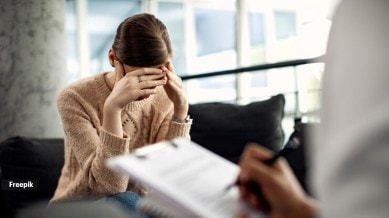Mental health support via text: New study shows why texting your therapist helps you deal with a crisis
Message-based psychotherapy (via text or email) can be effective in treating adults with mild to moderate depression, says study author

A 28-year-old had serious confidence issues while waiting to be interviewed for a job. Having faced rejection far too often because of performance anxiety, he texted Dr Shaunak Ajinkya, his psychiatrist at Kokilaben Dhirubhai Ambani Hospital, Mumbai, saying he could see himself failing again. “I texted him saying he would not have been shortlisted if he wasn’t any good, that he had already made it halfway and needed to reach the finish line. That he was being judgmental and needed to be open-minded about his interviewers whom he had not even met,” says Dr Ajinkya, who had pulled his patient out of depression and self-confidence issues through some sessions. That text helped the young man get past his interview.
“I reply to patients’ text messages about their queries and difficulties during follow-ups. A text message allows patients to receive immediate care without the constraints of a fixed appointment and helps them negotiate a particularly vulnerable moment when they feel too low,” says Dr Ajinkya.
What are the key takeaways? Can we rely on the power of words?
“I would say that the key takeaways are that message-based psychotherapy (via text or email), as delivered by licensed psychotherapists, can be effective in treating adults with mild to moderate depression, with similar rates of improvement in comparison to video-based psychotherapy. Another takeaway was that there were no adverse events, so that message-based care can also be delivered safely,” says Dr Raue.
Dr Ajinkya (not involved with the study) felt that since participants in the text-based group were found less likely to drop out of treatment, text-based therapy could significantly increase patient engagement and access. “It could work in a geography-agnostic manner,” he says.
Does this mean that an impersonal text-based talk therapy can work better without a visual image of the counsellor?
Dr Raue doesn’t consider text-based therapies as impersonal. “It may not work better but it may work just as well. The licensed therapist must be very attentive to creating a warm, supportive environment for participants to feel safe and connected and bring up real life concerns and struggles and successes. This may be more challenging to do than traditional therapy where you can see faces and communicate non verbally, but it is possible to do this effectively via texting/emailing,” he says.
Dr Ajinkya finds the format well-suited for therapies like Cognitive Behavioural Therapy (CBT), where the core work involves written reflection, labelling thoughts and challenging beliefs — all of which are easily done through text. “The effectiveness of this model stems from the core therapeutic work of identifying negative thought patterns, reframing them and establishing new behaviours being achieved through a written exchange of ideas and guidance, without the need for a visual image or an in-person session. For many patients, the low barrier to entry, flexibility and the convenience of never having to attend a physical appointment could have made this treatment sustainable and highly accessible in the long term. Text messaging can also be highly effective when blended with traditional face-to-face or video therapy,” he says.
A mental health professional can diagnose better when they can see the reactions of the patient, understand the nuances and context. Besides, many people may not be able to express themselves in words. In that case, won’t the guidance through text-based therapy platforms be general rather than being customised?
Of course, Dr Raue looks at many possible strategies that future research can investigate. “One promising strategy might be an initial video-based meeting to set the stage. The licensed therapist conducts a diagnostic intake via video,” he says.
Doesn’t the text-based consult over the phone seem too much like a bot? How easy is it to gain a patient’s trust through this method?
According to Dr Raue, this depends on the therapists, who have to make sure they are writing text as a real responsive human being and not “copy and pasting” automated text.
A lack of non-verbal cues in communication can adversely impact the therapist’s ability to diagnose the patient’s mental health condition accurately. “That’s why this therapy should be reserved for mild symptoms of mental health aberrations. A sudden change in posture, agitation, or tone of voice can signal an immediate crisis, such as self-harm, that could be easily missed in text. Also, online video sessions foster a stronger bond and building a deep, trusting alliance is more challenging for the therapist when the relationship is purely text-based and disembodied,” says Dr Ajinkya.
Besides, the effectiveness of the therapy depends heavily on the patient’s ability to articulate complex emotions and thoughts through writing. “The effectiveness of the therapy depends heavily on the patient’s ability to articulate complex emotions and thoughts through writing. Also, text-based therapy still raises questions about licensing, confidentiality, data security and the establishment of clear boundaries for emergency protocols. But in resource-scarce settings, text-based therapy can be the future of counselling as it provides patients suffering from mild, common mental disorders with unparalleled accessibility and comfort,” says Dr Ajinkya.